Are you ready to embrace scalability for sustainable growth in your business?
Don’t let the fear of growth adversely impact your business’ potential. Our expert team can help you scale your operations effectively and efficiently, ensuring you maintain quality and customer satisfaction even as you expand.
Scalability is a pivotal aspect for business growth as it enables a company to enhance its operations and performance under an expanding workload. It involves the ability to increase output or productivity with increased efforts and resources. A scalable business model allows a firm to grow its revenue with minimal additional cost. It’s essential for businesses to ensure scalability to meet market demands, maintain operational efficiency, and improve financial performance. Scalability also plays a vital role in business expansion strategies, product or service longevity, and profitability. Businesses should consider factors like resource availability, efficiency, market demand, financial viability, and quality control when scaling their product or service. Technology can significantly aid in enhancing scalability by automating processes and improving efficiency. In conclusion, embracing scalability is key to achieving sustainable growth and long-term success in today’s dynamic business landscape.
Table of Contents
- Introduction to Scalability: A Key for Business Growth
- Understanding the Concept of Scalability
- Why is Scalability Essential for Your Product or Service?
- The Relationship between Scalability and Business Expansion
- Factors to Consider when Scaling Your Product or Service
- Common Challenges in Achieving Scalability and How to Overcome Them
- Real-Life Examples of Successful Scale-Up Strategies
- How Technology can Aid in Enhancing Scalability
- Steps to Implement a Robust Scaling Strategy for Your Business
- Final Thoughts
Introduction to Scalability: A Key for Business Growth
Scalability is a critical factor that determines a company’s ability to increase its operations and improve its performance under an expanding workload. It signifies the capacity of a firm to adapt and grow in response to market demand. Whether it’s about increasing the production volume, extending service offerings, or expanding into new markets, scalability plays a crucial role. In simple terms, scalability means that as your business grows, you can maintain or enhance your level of performance even as you manage more work. It involves being able to increase output or productivity in response to increased efforts and resources.
In other words, if your business is scalable, then increasing your efforts will result in greater output. A scalable business model implies that an enterprise can multiply its revenue with minimal incremental cost. Scalability is essential because businesses need flexibility and adaptability in their operations, considering market dynamics are always changing due to competition and customer demands. The importance of scalability extends beyond just operational efficiency; it also has implications for financial performance. Businesses that can scale effectively often demonstrate better profit margins than those that struggle with scaling because they are able to generate greater revenue without equally large increases in costs.
Understanding the Concept of Scalability
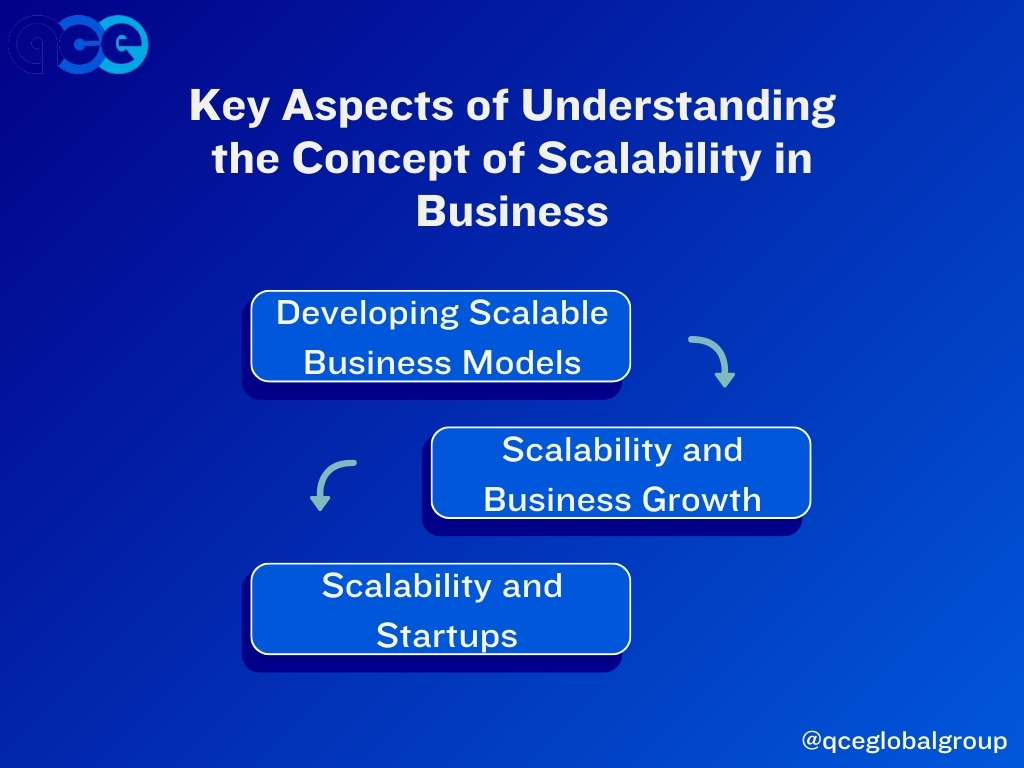
Scalability refers not only to growing more extensive but also to operating efficiently at any size – be it small or big – which gives businesses a competitive edge over others who cannot scale effectively. A scalable business model outlines how an enterprise can achieve significant growth rates without experiencing bottleneck issues such as inadequate resources or high operating costs, which could impede their progress. For instance, consider two bakeries – one operates by baking all pastries manually while another uses automated machinery for the same purpose. If demand for pastries increases significantly overnight (due perhaps to a holiday season), the first bakery may struggle with meeting this surge since they have limited manpower; whereas the second bakery would simply need more ingredients (which are relatively easy to procure) and can increase their output significantly since they use machinery. Therefore, the bakery with automated machinery has a scalable business model – they can ramp up production quickly without a significant increase in operating costs.
Here are the 10 Key Aspects of Understanding the Concept of Scalability in Business:
- Developing Scalable Business Models: A scalable business model can be designed by assessing the potential growth opportunities and the resources required to seize them. Businesses must focus on driving efficiency, reducing operating costs, and leveraging technology to optimize operations.
- Importance of Technology in Scalability: Technology plays a crucial role in ensuring scalability. Automation, artificial intelligence, and machine learning can help businesses scale their operations without significantly increasing operational costs. These technologies can automate repetitive tasks, enable better decision-making, and enhance productivity.
- Scalability and Cloud Computing: Cloud computing services can provide businesses with the necessary infrastructure to scale rapidly. By using cloud services, companies can handle increased traffic or workload without investing in additional hardware or software.
- Scalability in the Service Industry: In the service industry, scalability can be achieved by offering standardized services that can be replicated across different locations and markets. This allows businesses to serve a larger customer base without significant increases in operating costs.
- Scalability and Business Growth: Scalability is crucial for business growth. It allows businesses to expand their operations, enter new markets and increase revenue while keeping costs in check. A scalable business model ensures long-term sustainability and competitiveness.
- Scalability Challenges: While scalability can drive growth, it also presents challenges. These include managing quality control as operations expand, maintaining customer service standards, and ensuring sufficient resources are available to support growth.
- Scalability and Startups: For startups, scalability is an important consideration. A scalable startup can grow rapidly without incurring significant costs. This is often achieved through innovative business models, digital products, or unique service offerings.
- Scalability in E-commerce: In e-commerce, scalability can be achieved by utilizing scalable platforms that can handle increased traffic and sales volume. This allows businesses to meet fluctuating demand without compromising customer experience.
- Scalability and Outsourcing: Outsourcing non-core business functions can help businesses scale. By leveraging the expertise of third-party service providers, businesses can focus on core competencies and growth initiatives.
- Scalability and Innovation: Innovation plays a key role in scalability. By creating innovative products or services that can be produced and sold on a large scale, businesses can achieve significant growth rates.
Why is Scalability Essential for Your Product or Service?
Scalability is crucial for any product or service because it directly impacts the longevity and profitability of a business. When your product or service is scalable, you’re better equipped to accommodate growth and change. It means that your business model can sustain increased demand without compromising on quality or customer satisfaction. A scalable product allows you to meet increasing market demand while maintaining high standards of quality. This not only retains existing customers but also attracts new ones, thus driving revenue growth. Similarly, a scalable service ensures that as demand increases, service delivery remains efficient and effective. In this context, scalability often involves leveraging technology to automate processes and improve efficiency.
Here are the 10 Strategies for Enhancing the Scalability of Your Product or Service:
- Implementing Cloud-Based Systems: Cloud-based systems can easily adapt to increased demand, allowing businesses to scale up or down based on their needs. This reduces the need for physical infrastructure and thus, reduces costs.
- Leveraging Automation: Automation of routine tasks can significantly increase efficiency and allow businesses to handle larger volumes of work without compromising on quality or customer satisfaction.
- Adopting Agile Methodologies: Agile methodologies enable businesses to adapt quickly to changes in the market, allowing them to scale up or down as required.
- Outsourcing Non-Core Activities: Outsourcing activities that are not core to the business can free up resources and allow the business to focus on scaling its key offerings.
- Building Scalable Architecture: By developing a product or service with scalability in mind from the outset, businesses can prepare themselves for future growth.
- Utilizing Big Data: Big data can provide insights into customer behavior and market trends, allowing businesses to make informed decisions about scaling their product or service.
- Investing in Training and Development: As a business grows, it’s crucial that its employees have the skills and knowledge to handle increased demand. By investing in training and development, businesses can ensure they have the capacity to scale.
- Developing Strategic Partnerships: Partnerships can provide access to new markets and resources, enabling businesses to scale more effectively.
- Implementing Customer Relationship Management (CRM) Systems: CRM systems can help manage customer interactions more effectively, allowing businesses to scale without compromising on customer service.
- Focusing on Continuous Improvement: Businesses should constantly be looking for ways to improve their product or service, as this will enable them to meet increasing demand and continue to scale effectively.
The Relationship between Scalability and Business Expansion
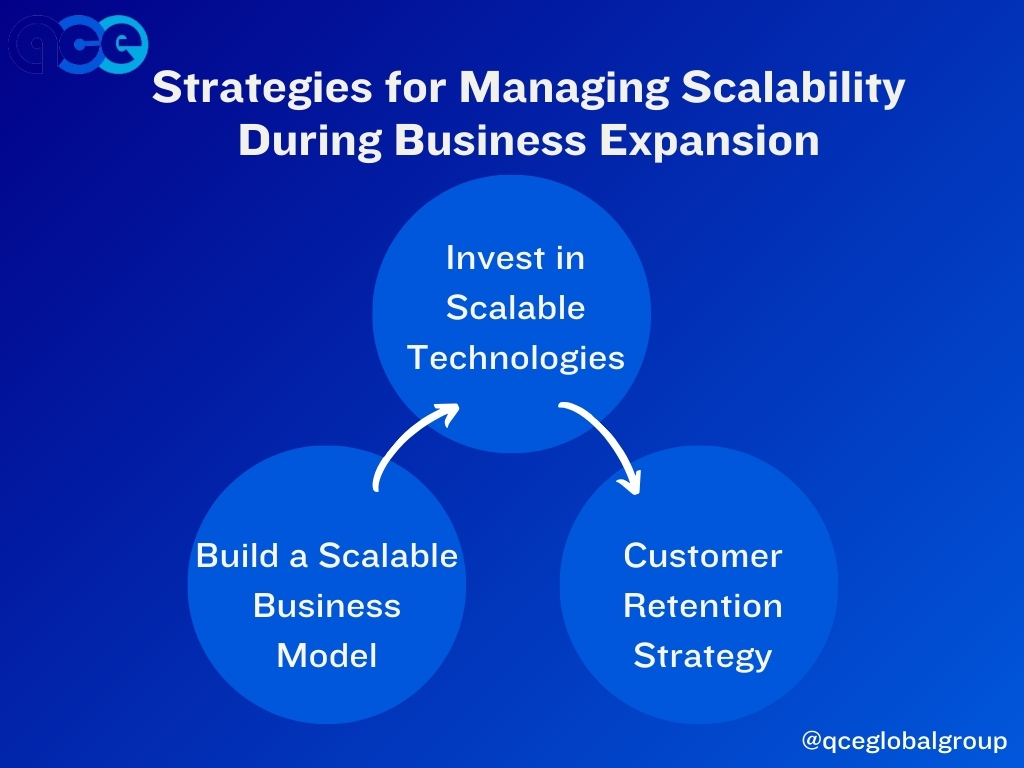
Scalability underpins successful business expansion strategies. A company’s ability to scale its operations effectively will determine how well it can move into new markets, extend its customer base, and compete at a higher level. When planning for expansion – whether through offering new products/services or entering new geographies – businesses need to factor in scalability from the outset. By doing so, they not only ensure a smooth transition during periods of rapid growth but also guard against possible risks such as operational inefficiencies or reduced quality, which could tarnish their brand reputation. In essence, then, scalability isn’t just about managing growth; it’s about managing risks associated with growth too, which makes it an indispensable element within any sound business strategy aimed towards expansion.
Here are the 10 Strategies for Managing Scalability During Business Expansion:
- Automate Processes: Automating repetitive, time-consuming tasks can free up resources and allow a company to scale more efficiently.
- Collaborate with Partners: Form strategic partnerships to leverage their skills and capabilities, which could enable the company to expand into new markets more easily.
- Invest in Scalable Technologies: Adopt technology solutions that can easily be scaled up as the business grows, such as cloud services or software-as-a-service (SaaS) platforms.
- Develop a Scalable Workforce: Implement flexible staffing solutions, such as contract workers or freelancers, to handle increased workloads during periods of growth.
- Streamline Operations: Identify and eliminate inefficiencies in the business processes to improve productivity and scalability.
- Build a Scalable Business Model: Ensure that the business model can support growth without requiring significant increases in costs or resources.
- Implement a Strong IT Infrastructure: A robust IT infrastructure is essential for managing increased data and system requirements as the business expands.
- Enhance Product/Service Offerings: Develop products or services that can be easily expanded or adapted to different markets.
- Customer Retention Strategy: Develop a strong customer retention strategy, as retaining existing customers is often more cost-effective than acquiring new ones.
- Continuous Learning and Adaptation: Maintain a culture of continuous learning and adaptation to deal with challenges that come with scaling and expansion.
Factors to Consider when Scaling Your Product or Service
When scaling your product or service, it’s crucial to consider several factors to ensure a smooth and successful transition. Firstly, demand projection is essential as you need an accurate estimate of the potential market size and customer base for your product or service. Next, you should evaluate your operational capacity including production, delivery, and customer service to ensure that they can handle increased demand. Financial planning is also vital to ensure you have sufficient resources for expansion while maintaining profitability. Furthermore, the quality of your product or service should not be compromised during scaling. Lastly, consider the potential impact on your team and whether you need to hire more staff or provide additional training. It’s also wise to anticipate any legal or regulatory implications that may arise due to your business’ expansion.
- Demand Projection: This involves making an accurate estimate of the potential market size and customer base for your product or service. You need to understand the demand for your product or service in your target market.
- Operational Capacity: Evaluate your current production, delivery, and customer service capabilities. Can they handle increased demand? If not, you need to make the necessary adjustments.
- Financial Planning: Scaling requires an investment. You need to plan your finances well to ensure that you have enough resources for expansion while maintaining profitability.
- Product/Service Quality: The quality of your product or service should not be compromised during scaling. You need to ensure that you maintain or even improve the quality as you expand.
- Team Impact: Consider the potential impact on your team. You may need to hire more staff or provide additional training to cope with the increased workload.
- Legal/Regulatory Implications: Expansion may bring about legal or regulatory implications. Make sure you understand these and how to navigate them.
- Market Competition: Understand the competitive landscape. How will your competitors react to your expansion and how can you stay ahead?
- Technological Infrastructure: Ensure that your existing technology infrastructure can support the scaling process. This includes your software, hardware, and other tech tools.
- Supply Chain Management: Evaluate your current supply chain and determine if it can handle the increased demand. You may need to establish new partnerships or strengthen existing ones.
- Customer Experience: Maintaining a positive customer experience is key during scaling. Make sure that your expansion doesn’t negatively impact your customers’ experience with your product or service.
Common Challenges in Achieving Scalability and How to Overcome Them
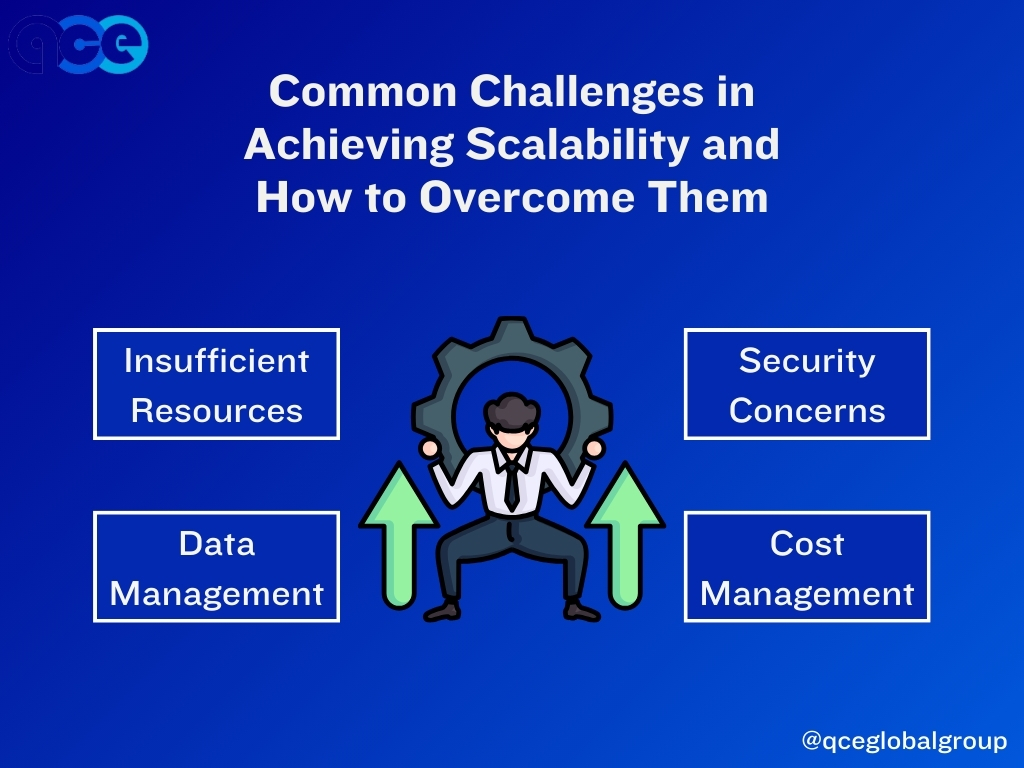
Scalability is a key concern for businesses, referring to a system’s ability to handle increased workload. Challenges to scalability include insufficient resources, system architecture limitations, and inefficient processes. These can result in system bottlenecks and resource wastage. To overcome these challenges, businesses should invest in scalable resources, redesign system architecture for growth, and improve process efficiency. Careful planning and regular evaluation are also crucial.
- Insufficient Resources: Often, businesses struggle to scale due to a lack of resources, both in terms of hardware and software. Upgrading to more powerful servers or implementing cloud-based solutions can help handle increased workload. However, managing the cost of these upgrades can be a challenge. To overcome this, businesses can consider using pay-as-you-go cloud services that allow you to scale up or down as needed.
- System Architecture Limitations: Traditional monolithic architectures can pose significant challenges to scalability. If the system was not designed with scalability in mind from the outset, it might be difficult to expand it later. Adopting a microservices architecture, where different tasks are handled by separate, loosely coupled services, can offer greater scalability and flexibility.
- Inefficient Processes: A system’s efficiency can greatly impact its scalability. Slow, manual processes can lead to delays and system bottlenecks. Automating processes wherever possible, using artificial intelligence and machine learning, can improve efficiency and help the system cope with increased workload.
- Data Management: As businesses grow, so does the amount of data they handle. Without a proper data management strategy, this can lead to inefficiencies and slow down the system. Implementing a robust data management system that can handle large volumes of data is crucial for scalability.
- Security Concerns: As a system scales, it often becomes more complex and potentially more vulnerable to security threats. Implementing robust security measures at every level of the system is crucial to protect data and maintain trust with customers.
- Performance Monitoring: Regular evaluation of the system’s performance can help identify potential bottlenecks and areas for improvement. Using performance monitoring tools can provide valuable insights into how well the system is coping with increased workload and where improvements can be made.
- Training and Support: As the system scales, staff may need additional training to use new tools and processes efficiently. Investing in ongoing training and support can ensure that everyone is able to contribute to the business’s growth effectively.
- Change Management: Implementing changes to a system can be disruptive. Therefore, it’s important to have a solid change management strategy in place to ensure that changes are implemented smoothly and any potential issues are addressed promptly.
- Cost Management: Scaling a system can be expensive, especially if it involves investing in new hardware or software. Developing a clear cost management strategy can help businesses plan for these expenses and ensure that they get the most value from their investment.
Real-Life Examples of Successful Scale-Up Strategies
Companies like Amazon and Uber are classic examples of successful scale-up strategies. Amazon started as an online bookseller but quickly scaled its operations by expanding into various product categories and developing advanced technologies such as AI-driven recommendation engines. Similarly, Uber began by offering taxi services but quickly scaled by adding new service lines (like food delivery through UberEats), expanding into new geographies, and leveraging technology effectively. Both companies demonstrate how the effective use of technology, coupled with strategic vision, can drive successful scalability initiatives leading to exponential growth.
- Airbnb: Airbnb’s successful scale-up strategy involved expanding from a single city to more than 100,000 cities around the world. They achieved this by focusing on their users’ experience and creating a platform that enabled hosts to list their properties easily and guests to book unique accommodations conveniently.
- Spotify: Spotify scaled up by expanding its music streaming service to podcasts, videos, and even live events. In addition, they diversified their revenue streams by introducing premium subscriptions and advertising.
- Tesla: Tesla’s scale-up strategy focused on creating a vertically integrated business model. They manufacture their own batteries, operate their own sales showrooms, and even build charging stations, allowing them to control the entire customer experience.
- Netflix: Netflix began as a DVD-by-mail service but quickly scaled-up by pivoting to a streaming platform. To ensure a steady stream of content, they moved into content production, creating popular original series and movies.
- Alibaba: Alibaba’s scale-up strategy involved creating a comprehensive ecosystem of e-commerce platforms that cater to different market segments. They also expanded their services to include digital payment systems, cloud computing, and artificial intelligence.
- Slack: Slack’s strategy has been to integrate its platform with as many other work tools as possible, making it a central hub for communication and collaboration in the workplace. This has allowed them to scale up rapidly.
- Microsoft: Microsoft’s scale-up strategy involved diversifying its product offerings, moving from a focus on PC operating systems to providing a comprehensive suite of software, hardware, and cloud services.
- Google: Google scaled up by diversifying its offerings beyond search, moving into areas like cloud computing, mobile operating systems, hardware, and even self-driving cars.
- Facebook: Facebook’s scale-up strategy involved acquiring other successful social media platforms like Instagram and WhatsApp, allowing them to expand their user base and diversify their revenue streams.
- LinkedIn: LinkedIn scaled up by focusing on creating a strong network effect, where each new member increases the value of LinkedIn to other members. They also diversified their revenue streams by offering premium subscriptions and through advertising.
How Technology can Aid in Enhancing Scalability
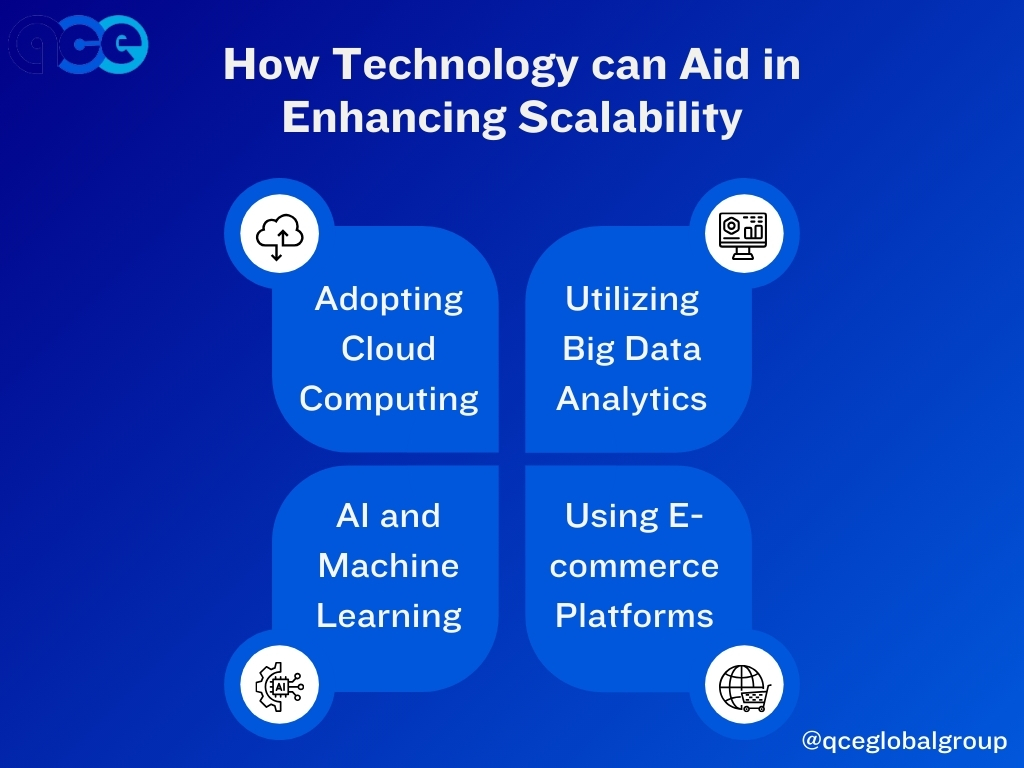
Technology plays a crucial role in enhancing scalability because it enables the automation of repetitive tasks, thereby reducing the manual intervention required – this not only improves efficiency but also allows for rapid scaling of operations. For instance, cloud computing allows businesses to scale their IT resources (storage/computing power) in line with growing needs. Similarly, AI can automate processes like customer service or data analysis, which would otherwise require substantial manpower. Additionally, digital platforms enable businesses to reach larger audiences without significant investments – this is particularly beneficial for the services sector where physical infrastructure costs can be prohibitive.
Here are the 10 Technology Strategies to Enhance Business Scalability:
- Implementing Robotic Process Automation (RPA): RPA can be used to automate repetitive and mundane tasks, thereby freeing up human resources to focus on more complex and strategic tasks. This will not only increase efficiency but also allow businesses to scale rapidly.
- Adopting Cloud Computing: By moving to the cloud, businesses can easily scale their IT resources based on their needs. This eliminates the need for investing in expensive hardware and allows businesses to pay for only what they use.
- Utilizing Big Data Analytics: With the help of technology, businesses can analyze large volumes of data to make informed decisions. This can help businesses identify trends, predict customer behavior and improve their products/services, thereby enhancing scalability.
- Leveraging AI and Machine Learning: AI and machine learning can automate complex tasks like customer service and data analysis. This not only improves efficiency but also allows businesses to scale without significant investments in manpower.
- Using E-commerce Platforms: E-commerce platforms allow businesses to reach larger audiences without the need for physical stores. This significantly reduces overhead costs and allows businesses to scale rapidly.
- Adopting Blockchain Technology: Blockchain technology provides a secure and transparent way of conducting transactions. This can help businesses scale by ensuring trust and reducing fraud.
- Implementing IoT Solutions: IoT devices can automate various processes like inventory management, thereby improving efficiency and enabling businesses to scale.
- Using Digital Marketing Strategies: Digital marketing strategies like SEO and social media marketing can help businesses reach a larger audience without significant investments.
- Adopting Virtual Reality (VR) and Augmented Reality (AR): VR and AR can be used to provide immersive experiences to customers, thereby increasing customer engagement and allowing businesses to scale.
- Utilizing Software as a Service (SaaS): SaaS allows businesses to use software on a subscription basis, eliminating the need for large upfront investments. This makes it easier for businesses to scale their operations.
Steps to Implement a Robust Scaling Strategy for Your Business
Implementing a robust scaling strategy involves understanding your business model, setting clear objectives, investing in technology, building a strong team, and regularly monitoring and adjusting the strategy. Key steps include identifying growth drivers through market analysis and customer segmentation, defining KPIs, streamlining processes with technology, fostering a flexible and adaptable organizational culture, and leveraging new opportunities. The strategy should be comprehensive, flexible, and focused on long-term sustainability.
- Understand Your Business Model: A deep understanding of your business model is the first step in creating a scaling strategy. This involves a comprehensive understanding of your value proposition, revenue model, resources, and key partnerships, among others. Your scaling strategy should be rooted in the strengths and opportunities presented by your business model.
- Set Clear Objectives: Setting clear and realistic objectives is crucial. These objectives should be aligned with your company’s vision and mission. They should also be specific, measurable, achievable, relevant, and time-bound (SMART).
- Invest in Technology: Technology plays an integral part in scaling a business. It helps automates processes, increases efficiency, and facilitates growth. This can include software for customer relationship management (CRM), enterprise resource planning (ERP), digital marketing, and more.
- Build a Strong Team: A strong and motivated team is crucial for executing a scaling strategy. This involves recruiting the right talent, providing them with the necessary training and resources, and fostering a culture of innovation and collaboration.
- Identify Growth Drivers: This involves conducting a thorough market analysis and customer segmentation to identify potential growth drivers. This could be a new market segment, a new geographical market, a new product line, or a new service offering.
- Define Key Performance Indicators (KPIs): KPIs help measure the success of your scaling strategy. These could be revenue growth, customer acquisition cost, customer lifetime value, net promoter score, or other relevant metrics.
- Streamline Processes: Streamlining processes is vital for managing increased workload and ensuring efficiency as your business grows. Technology can play a key role in this, automating repetitive tasks and integrating various functions.
- Foster an Adaptable Culture: An adaptable organizational culture is essential for a successful scaling strategy. This involves encouraging innovation, fostering a learning culture, and being open to change.
- Leverage New Opportunities: Being open to and leveraging new opportunities is key to scaling. These could be partnerships, acquisitions, or new market trends.
- Regularly Monitor and Adjust the Strategy: A scaling strategy should not be set in stone. Regular monitoring and adjustments are necessary to accommodate changes in the business environment and to ensure the strategy remains effective and relevant.
Final Thoughts
Scalability isn’t just about growth; it’s about sustainable growth. It’s about being able to grow without compromising on quality or efficiency. It’s about being adaptable enough to meet changing market demands while maintaining profitability. In essence, then, scalability is central to achieving long-term success in today’s fast-paced business world. As such, embracing scalability should be part of any forward-thinking business strategy because, ultimately, it’s not just size that matters; it’s how well you manage that size which determines success in the long run.
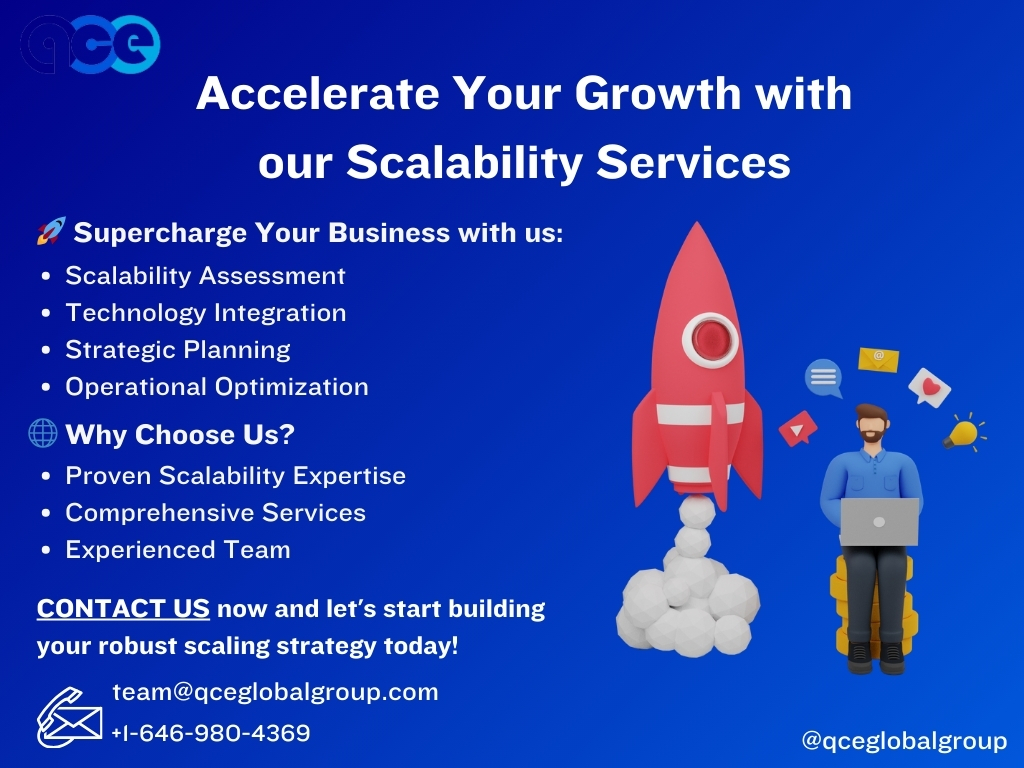
Contact us now to start your journey towards successful, manageable growth.
Let’s make your business not just bigger, but better together!



